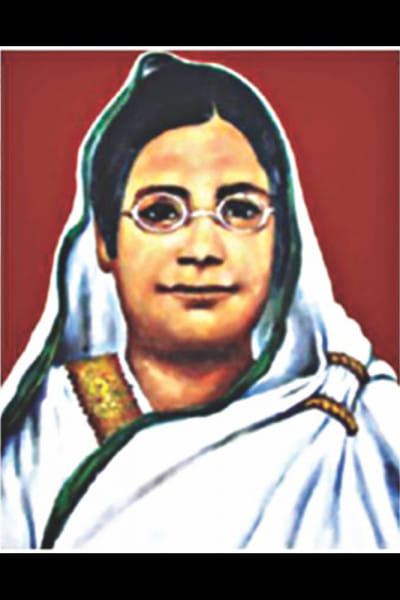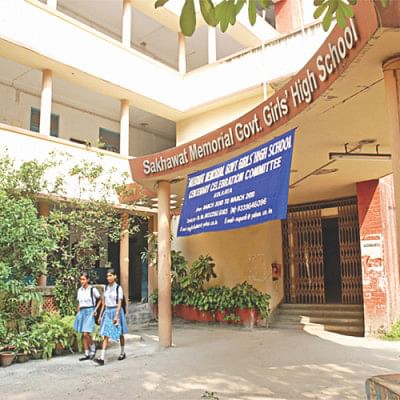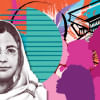Brilliantly rejecting the notion of inferiority

Rokeya (English spelling used by her: Roquiah) was born circa 1880 (alternately 1878) to a declining aristocratic land-owning family in the village of Pyrabund, Rangpur in present-day Bangladesh. Rokeya would have been a neglected child, had it not been for the care and tutoring provided by her elder brother Ibrahim Saber and sister Karimunnessa Khanum. Between them, they secretly taught Rokeya how to read and write, specially the language of the new elite, English, and that of the perceived non-aristocratic class (atraf), Bangla or Bengali. Later on, her husband would tutor her in English (as she would teach the Urdu-speaking Sakhawat Bengali).
Her husband's untimely death in 1909 spelt tragedy for the childless Rokeya, their two infants having died in childbirth. Widowed and alone, she had to take refuge in Kolkata rather than linger on in the hostile atmosphere created by her step-daughter and her family in the Bhagalpur home. In Bhagalpur, Rokeya had embarked on her writing career with Pipasa, Niriha Bangali and Sultana's Dream (1908).
Rokeya's writing follows in the tradition set by the nineteenth-century chaste, (modern) prose of writers such as Vidyasagar and Bankim. Much more an essayist than a novelist or poet, Rokeya's writing is characterised by what Abdul Mannan Syed has aptly termed manoswikata which may be loosely translated as "intellect." Logic, humour, irony and overall a clear analysis and focus on the matter at hand, are salient characteristics.
In one of her earliest pieces Rokeya declares: "In ancient ages when there was civilisation, or social borders, we were not such slaves. As man became more civilised... he started to exert his domination over women through naked force and intellectual craft... the society which created monarch and subject, distinction between law enforcing and state authorities, has also subordinated woman to man ... they have subordinated woman through their physical and intellectual prowess..." (RS Hossein, Streejatir Abanati, in Rokeya Rachanaboli, henceforth RR, 1973:17). It is in this piece perhaps, more than in any other, Rokeya formulates clearly her thoughts on the subordination of women, establishes, the fact of subordination in history, rather than any law of nature, religion, and even uses the term "slavery" for the state women were in.
Rokeya's brilliance lies in the fact that she rejected outright any notion of natural/biological/spiritual inferiority of women. Having done this she sought the reasons of subordination in historical evolution, rather than biology or divine will. She held that centuries of subjection have led women to internalise the notion of inferiority.
In the opening lines of her essay Ardhangi she writes: "It is necessary to study the symptoms of a disease before treatment can commence. Hence one has to depict the degraded conditions of the so called 'helpless race' before remedies may be sought. In Streejatir Abanati I have shown my sisters that they suffer from the disease of enslavement and dwelt on its causes and symptoms. Now it is time to trace the impact of this malady on society." (RR, 1973:35)
Her only novel Padmarag which was written much earlier but published in 1924, portrays a sort of "women's commune" or ashram where destitute or helpless women from all of the major communities of India – Hindu, Muslim, Christian, Brahmo – seek refuge. In tracing the stories of each of the inmates of the ashram 'Tarini Bhaban', Rokeya depicts how each woman became a victim in her particular society. Quite deftly the author illustrates through inmates narratives - the various sites of patriarchal oppression.
"It is not easy at first to rise from this stupor we know... Muslims of India will pass sentence of 'talak' the same letters to say 'katl' (a death sentence) on us; and Hindus will pass that of burning on the pyre (and the sisters too are not desirous of awakening, we know!) But rise we must for the good of society!' (Streejatir Abanati, RR, 1973:28)

Rokeya's vision was far-sighted in that she also provided solutions. True to her calling of a true reformer, she spelt out in her works the solutions or cures to maladies she perceived in society. These solutions may be listed under the categories of education; waged work; consciousness-raising and solidarity (sisterhood).
For her own and future generations, Rokeya has also left behind alternative visions of a society in which women may seek refuge. The first example is the ashram/commune 'Tarini Bhaban' in her novel Padmarag. This must have seemed like an Utopian vision when Rokeya published it in 1924 -- literally a refuge where women from all communities and classes, may live and work in dignity and sisterhood.
In Sultana's Dream, Rokeya's fantasy, a somewhat satirical picture presented of the author's vision of a society with an alternative structure --- gender relations. In the dream world, Ladyland, gender relations are reversed, and men stay indoors in the mardana and women inhabit the public space.
A question that arises today is whether Rokeya may be termed a "feminist", and if so, to what extent? In recent years the term has gained currency in our part of the world as well. Though naribadi is a Bengali translation of an English word, if feminism basically means equal rights for women in the core societal institutions which presently operate on patriarchal or male-centred principles, it existed in South Asia even in the 19th century. The term was not there – Rokeya never called herself a feminist, nor did others label her so. But everyone knew they were dealing with the "Women's Question" and Rokeya was described as the harbinger of the women's awakening, its ambassador pilgrim (doot, broti).
Today as we look back at the work of this pioneer, more than a hundred years after her first essay was published, we have to pause and evaluate her for the breadth and vision of her achievement and her relevance today. Many of the social ills she wrote about still exist, some new ones have been added; patriarchal oppression is alive and increasing through the new forces of religious extremism. True, as Rokeya dreamt, women have their BAs, MAs, PhDs; they grace the offices of judge and magistrate, even head of state. Nonetheless, the strength of a chain is its weakest link and no one will argue that the women of our country do not suffer from the negative impact of unequal legal and economic status, unfavourable cultural norms and gender roles. We are yet to shed the "badges of slavery." Rokeya's writings, her feminist thought, her contributions are still very relevant, her objectives still elusive. As her biographer Shamsun Nahar Mahmud wrote: "We have not yet reached the zenith. As we march on, our victory flags will tip downward in salutation to that woman who retrieved the infant and brought it into light from the cave of darkness." (Rokeya Jibani, 1937: 19-86).
A longer version of this article was published in the Oxford Dictionary of National Biography (Oxford, 2004).
Sonia Nishat Amin (professor, Dept of History, University of Dhaka) specialises in the study of gender and culture in colonial Bengal .










Comments